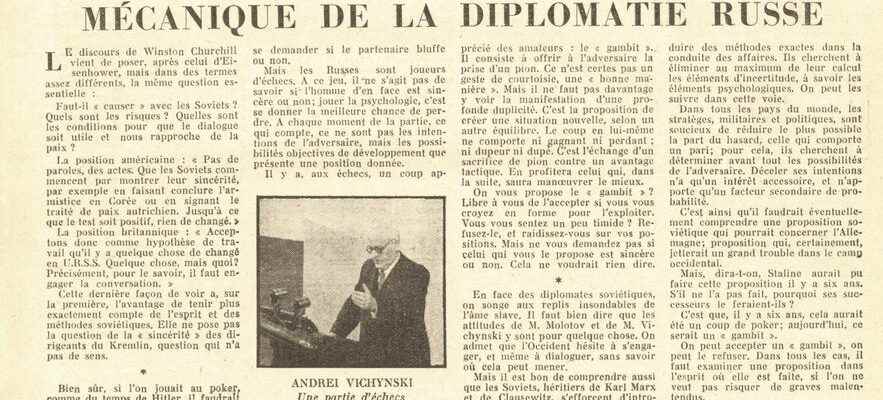For seven decades, our newspaper has covered and analyzed all the highlights of our contemporary history between decolonization, the Cold War, European construction, the advent of the Fifth Republic… It is committed to social struggles such as the abolition of the death penalty or the emancipation of women and welcomed great feathers like François Mauriac, Albert Camus or Jean-Paul Sartre. By turning the pages of our archives, we invite you to relive the news of the past seventy years.
We are on May 16, 1953, the French discover L’Express, the Saturday supplement of Les Echos*. Between a great interview with Pierre Mendès-France and an analysis of the political future of General de Gaulle, the newspaper examines the balance of power between the great powers. Stalin’s death two months earlier opened a new diplomatic era. While the Korean War has been raging for nearly three years, the United States and the United Kingdom are at odds over the attitude to adopt towards the Kremlin, master of the game on the chessboard of world diplomacy.
Mechanics of Russian diplomacy
Winston Churchill’s speech has just posed, after that of Eisenhower, but in quite different terms, the same essential question: should we “talk” with the Soviets? What are the risks ? What are the conditions for dialogue to be useful and bring us closer to peace?
The American position: “Not words, deeds. Let the Soviets start by showing their sincerity, for example by concluding the armistice in Korea or by signing the Austrian peace treaty. Until the test is positive, nothing changed.”
The British position: “So let’s accept as a working hypothesis that something has changed in the USSR Something, but what? Precisely, to find out, you have to start a conversation.” This last view has the advantage over the first of taking more exactly into account the Soviet spirit and methods. It does not ask the question of the “sincerity” of the leaders of the Kremlin, a question that makes no sense.
Russians are chess players
Of course, if we were playing poker, like in Hitler’s time, we would have to ask ourselves if the partner is bluffing or not. But the Russians are chess players. In this game, it is not a question of whether the man opposite is sincere or not; to play psychology is to give yourself the best chance of losing. At each moment of the game, what matters are not the opponent’s intentions, but the objective possibilities of development presented by a given position.
There is, in chess, a move appreciated by amateurs: the “gambit”. It consists of offering the opponent the capture of a pawn. It is certainly not a gesture of courtesy, a “good manner”. But it should not be seen either as the manifestation of a profound duplicity. It is the proposal to create a new situation, according to another balance. The trick itself has no winner or loser or trickster or dupe. It is the exchange of a pawn sacrifice against a tactical advantage. The one who will know how to maneuver the best will benefit from it. We offer you the “gambit”? You are free to accept it if you think you are fit to exploit it. Are you feeling a bit shy? Refuse it, and stiffen your positions. But do not ask yourself if the person offering it to you is sincere or not. It wouldn’t mean anything.
Article published in the first issue of L’Express, May 16, 1953
© / The Express
Reduce the part of chance
Faced with Soviet diplomats, one thinks of the unfathomable recesses of the Slavic soul. It must be said that the attitudes of Mr. Molotov and Mr. Vichynsky have something to do with it. It is admitted that the West is reluctant to engage, and even to dialogue, without knowing where this may lead. But it is also good to understand that the Soviets, heirs of Karl Marx and Clausewitz, strive to introduce exact methods in the conduct of business. They seek to eliminate as far as possible from their calculation the elements of uncertainty, to know the psychological elements. We can follow them in this way.
In all the countries of the world, the strategists, military and political, are anxious to reduce as much as possible the part of chance, that which involves a bet; for this, they seek to determine above all the possibilities of the adversary. Detecting his intentions has only an ancillary interest, and only brings a secondary factor of probability. This is how a Soviet proposal that could concern Germany should possibly be understood; a proposal which would certainly cause great trouble in the Western camp.
But, it will be said, Stalin could have made this proposal six years ago. If he didn’t, why would his successors? It’s because, six years ago, it would have been a gamble; today it would be a “gambit”. We can accept a “gambit”, we can refuse it. In any case, a proposal must be examined in the spirit in which it is made, if one does not wish to risk serious misunderstandings.
* According to the practice in force at the time at L’Express, the articles were not signed.
